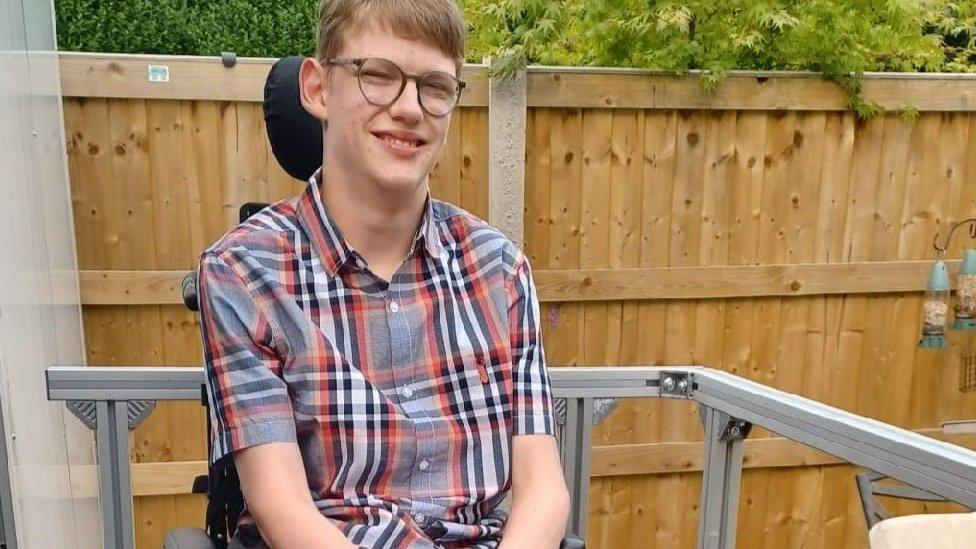Promise to increase funds to adapt disabled people's homes shelved
- Published

Finlay's mother is trying to raise funds to carry out alterations to their home
The government has quietly dropped a commitment to increase the amount of money that disabled people in England can claim to adapt their homes.
The Disabled Facilities Grant (DFG) is used to fund alterations aimed at easing living at home, such as installing wet-rooms or stairlifts.
The maximum amount a person is entitled to claim has been capped at £30,000 since 2008.
But in real terms, that means it's now worth around a third less.
The Local Government Association (LGA) told a committee of MPs that £30,000 was "now insufficient for most major building work costs".
Victor Chamberlain, from the LGA, told the Levelling Up committee that topping up the grants was putting more pressure on adult social care budgets.
"With build cost inflation, the cost of doing serious major works adaptations, it just doesn't touch the sides really so I think we really do need a significant increase in support for the DFGs from government."
The government said it had put an additional £100m towards the grant over two years, so that "more people can benefit".
Alexa Woodcock moved in to her home in Chester just over two years ago with her son Finlay Woodcock-Daniels, who is 17 and has cerebral palsy.
She raised money to install low access doors and ramps so he can get in and out of the house using his wheelchair, and applied for the Disabled Facilities Grant to reconfigure the entire downstairs.
"Doors need widening, some doors need moving, purely to make Finlay's movement around the house easier because he's also visually impaired."
She says he also needs a wet room on the ground floor and safer access to the garden, along with a small extension to provide living space for the family.
"His downstairs bathroom has been gifted to us by a local company. It's a prefab, like a posh festival toilet. It costs £20 a day to heat, which I can't afford to do. In the mornings in winter, he's going in there and it's cold.
"He can't access anything in the kitchen. He can't access our fridge because it's another area of the house that he can't get to so he, as a young man, can't develop any skills for independence at home, because our home is disabling to him.
"He's never had a fully accessible home and I find that heartbreaking."
Alexa says she has been quoted £80,000 for building work and another £14,000 for project management.
In November last year, her local council offered her the £30,000 maximum grant with an additional £10,000 of discretionary funding but Alexa says she can't afford to fund the difference so the work can't happen.
"I work full time, I'm a single mum, I've got three kids, I'm a teacher. I've raised enough money on our mortgage so we could move and I've maxed out. I can't afford to get a loan. There's no other money available."
She is now trying to fundraise.
Anna Bird, chief executive of the disability charity Contact, said she had heard from other families who were fundraising for adaptations.
She said unsuitable housing had "a huge detrimental impact on the physical and mental health of families with disabled children and this urgently needs to be addressed".
Councils are able to offer their own additional funds to individuals but the amount can vary between areas.
An external review commissioned by the government in 2018 recommended that the upper limit of the Disabled Facilities Grant should rise in line with inflation, with further allowances made for more expensive areas.
Means test for adults
In 2021, the government promised to increase the maximum amount that could be claimed.
In a policy paper it said "we are taking steps to ensure that the grant can reach more people who will benefit from it. We are increasing the amount that the grant can pay for an individual adaptation. This will mean that more people who need the grant across the country will be able to access it."
Parents of children with disabilities are able to claim the maximum amount, regardless of income, but disabled adults have to take a means test.
The government also promised to look at reforming the test which it acknowledged could be "complex" and "difficult to navigate".
It promised to consult on both measures in 2022, along with how funding is distributed, but none of the consultations took place.
Amy Little, Head of Advocacy at Leonard Cheshire - a charity which helps people with disabilities live and work more independently - said that the grant was vital, as finding an accessible home was not easy.
"Yet as costs rise, the amount individuals can apply for has remained static since 2008," she said. "The upper limit must rise with inflation and the means test must be updated."
A spokesperson for the Department for Health and Social Care said: "Our programme of social care transformation is working to ensure that people can access the right care, in the right place, at the right time and we are focused on the priorities in our ambitious 10-year reform programme.
"The Disabled Facilities Grant helps around 50,000 people each year to adapt their homes to help them live more independently.
"Last March we announced an additional £100m over two years for the Disabled Facilities Grant, on top of the more than £500m already available annually for grants - so that more people can benefit."
The Disabled Facilities Grant is capped at £36,000 in Wales and £25,000 in Northern Ireland, while Scotland operates a different system.
Related topics
- Published22 November 2023
